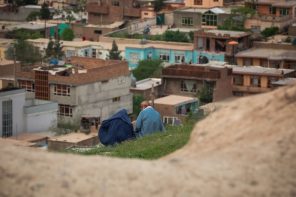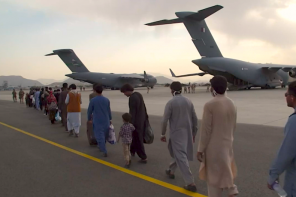It should come as no surprise that Makana, a mountain on Kauai known for an ancient fire ritual, is a popular name in Hawai’i. It means “gift or reward” in Hawai’ian, and it is the name adopted by the slack key guitarist Matthew Swalinkavich, who started playing and performing ki ho’alu (the Hawai’ian for “slack key”) at age seven. Now 33, Makana is a mountain among ki artists, and a growing luminary on the world music scene, earning Grammy nominations, opportunities to play with rock legends like Santana and Sting, and invitations to perform for various muckety-mucks.
It’s with the muckety-mucks that Makana’s story has taken a particularly interesting turn of late.
The Music of Dangerous Memory
Makana garnered global attention last week after a luau hosted by President Obama for world leaders at the Asia-Pacific Economic Cooperation (APEC) conference in Honolulu, where he played a mellowed-out set that started with traditional Hawai’ian music then veered gently into edgier material. Dylan’s biblical reflection on justice, “All Along the Watchtower,” and Sting’s lament against violence, “Fragile,” were the subtle prelude to a more subversive piece: the Hawai’ian protest song, “Kaulana Na Pua” (“The Stone-Eating Song”).
Had anyone in the gathering understood Hawai’ian, eyebrows might have been raised at the song’s wrenching expression of rage over the annexation of Hawai’i by the United States in 1893—a dangerous memory if there ever was one. “No one will fix a signature/ to the paper of the enemy/ with its sin of annexation/ and sale of native civil rights,” the song insists, against Hawai’ian music so sweetly melodic that tourists are unable to hear it as tears.
Certainly the world leaders did not. Neither, beyond a few curious glances, did the they seem much to register the low-key grand finale of the set: a 45-minute rendition of his recently released anthem in support of the Occupy Movement, “We Are the Many,” sung after Makana went subliminal Superman, unbuttoning his dress shirt and opening his suit jacket to reveal a t-shirt reading “Occupy with Aloha.” Were Makana more of a belter (or, were anything more interesting to the world leaders than their own conversation) someone might have choked on lyrics like these: “Ye come here, gather ’round the stage/ The time has come for us to voice our rage/ Against the ones who’ve trapped us in a cage/ To steal from us the value of our wage.”
Makana as the Message
The wave of mainstream media coverage in the aftermath of the performance has focused on the MacGyver-like cunning of Makana and his sound technician, who were able to create a video of the performance, despite a Secret Service prohibition on cell phones, because Makana’s guitar is tuned with a smartphone app. Or, reporters are interested in how Obama, his guests, and security detail responded—or didn’t, as it turned out.
But this misses the heart of the story, as Makana’s set at the APEC dinner was less dissenting performance than performative utterance—the songs he played, the protest t-shirt hidden beneath the complaint dinner musician’s suit, and the secretive cell phone video coming together not merely to support the Occupy Movement or to represent the concerns of the protesters, but to effect an occupation where he had the opportunity to do it most powerfully, and, in doing so, to make real the nonviolent, non-combative, even respectful, ethos of a movement that continues to vex so many in the media and in positions of political leadership.
“I approached the song as though I was given an opportunity by these world leaders,” Makana explains. “As though I were asked, ‘Hey, what’s your idea? What’s your input?’”
Makana was hardly unaware of the risk, the force of which he balanced against a core commitment to what he calls “true freedom,” an idea of radical nonattachment to particular belief systems through a rigorous, regular questioning of, well, everything—perhaps especially what is spinning in your mind in charged moments like the one in which Makana had found himself that evening in Waikiki.
“I found it odd,” he says, “that I was afraid to [sing “We Are the Many”] at first. I found it disturbing. I didn’t like the idea of being afraid of singing a song that I had created in front of any group of people.” He continues,
I knew the power in the words that I had written. And, in a world that was free of punishment for being yourself… I would have sung it at the top of my lungs. But I also didn’t want to do it out of disrespect. I did it because there was really no other option at that point. I had to do it. I had to forget about what could happen to me. I was guided by something bigger… I don’t know what it is… I can’t put a name to it… The whole thing was providence.
Given the risk that the singer-songwriter took at the moment he decided to go ahead with the song, the spirit of another Makana comes to mind. This one, not Hawai’ian, but rather the 19th-century rebel leader from the South African Xhosa tribe known as Makana the Prophet, who led something of an occupy movement against the British in 1819. Though taking a toll on the British, the Xhosa were out-manned and out-gunned, and Makana the Prophet eventually surrendered himself to prevent further bloodshed. He was imprisoned on Robben Island, where he perished while leading the escape of some thirty fellow prisoners. It is said that Nelson Mandela, Robben Island’s most famous 20th-century prisoner, called for the renaming of the prison in honor of Makana.
Of course, Hawai’i’s Makana has hardly suffered beyond that moment of existential anxiety as he weighed, in an instant, the pros and cons of pissing off the president and possibly torpedoing a flourishing career. Sure, he’s unlikely to be invited to entertain Obama and friends anytime soon, but no one’s dragged him by the hair to the ground, “nudged” him with a nightstick, or pepper sprayed him at close range. He’s certainly mindful of the difference between his stage and that of the protesters, but Makana sees the same spirit of aloha—a spirituality lost, like so many Hawai’ian protest songs, on many outsiders—as animating even angry dissent with love:
It takes great courage and self-sacrifice to protest something that you feel is unjust and is causing harm to people… All I can do is look at what’s going on and envision in my heart that people come from a place of love and kindness—all people. This is what I mean by “occupying with aloha.”
Melody for a Movement?
Twenty or so of the world’s most powerful leaders may have mostly tuned his song out over the dessert course, but people across the country and around the world are tuning in, which may mean that Makana has risen to James McKinley’s challenge, offered last month in a New York Times article, for a protest anthem that would give a melody to the Occupy message. Quoting Dorian Lynskey, the article suggests that the economic crisis provides little fodder for a musical genre that, throughout the 1960s and ’70s, was the beating heart of American dissent. Says Lynskey, “What do you say about a financial crisis where the villains are obscure and the solutions are obscure? That’s a challenge.”
Makana seems to have gotten the job done, spelling out protesters’ frustrations with corporations, market capitalists, lobbyists, political leaders, the wars in Afghanistan and Iraq, and the bank bailout, while naming the refusal of party politics and the embrace of social media that makes “occupation” a much bigger ideological and practical strategy than trampling tents at Zuccotti Park or in downtown Oakland even begins to understand. And then, so not for nothing, he manages to sum it up with a catchy refrain (played, he says, some fifty times at the APEC dinner):
We’ll occupy the streets
We’ll occupy the courts
We’ll occupy the offices of you
Till you do
The bidding of the many, not the few
We are the many
You are the few
As we mark the two-month anniversary of the Occupy Movement, the gift of an anthem seems more than fitting. Now everybody sing… with aloha.




